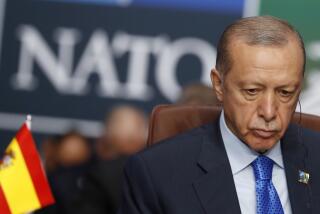Yugoslavs May Be Barred From U.N. Seat : Diplomacy: Russian veto threat eases after Belgrade leader says his truncated nation would reapply to world body.
- Share via
WASHINGTON — The five permanent members of the U.N. Security Council apparently resolved their differences Wednesday over a bid to bar the Serbian-dominated remnant of Yugoslavia from a U.N. seat, paving the way for council approval of the plan later this week.
Although diplomats cautioned that no formal deal has been struck yet, negotiators outlined the elements of a plan that they said is likely to satisfy Russia, which objected to an earlier proposal that would have expelled the Belgrade government permanently.
As one of the five permanent members of the 15-member council, Russia can veto a resolution. China, another one of the five, has indicated that it will go along with the plan. The other three--Britain, France and the United States--support the bid.
The uncertainty over the possibility of a Russian veto eased Wednesday after news services reported that Milan Panic, Yugoslavia’s prime minister, announced that his government would abandon its efforts to retain the U.N. seat of the former Yugoslavia.
Panic, in Moscow for consultations, said his country will immediately apply for admission as a new nation, Russia’s Itar-Tass news agency reported. And Andrei Kozyrev, Russia’s foreign minister, said Russia will support the new application.
Western diplomats said Wednesday it is clear that the Russians, eager to work out a compromise, had pressured Panic to abandon his government’s claim to the Yugoslav seat. They said his announcement clears the way for Russian cooperation on the issue.
If the proposal is adopted by the Security Council--and later by two-thirds of the General Assembly--it would mark one of the most sweeping such actions in U.N. history. South Africa had its voting power suspended in 1974, but its right to its U.N. seat was never disputed.
European countries, backed by the United States, have sought to block Belgrade from assuming the Yugoslav seat in the United Nations, partly because of Serbia’s role in the war against Bosnia-Herzegovina, which declared its independence last February.
Bosnia, Croatia and Slovenia--three of the four republics that have seceded from the former Yugoslavia--already are recognized by the United Nations. The fourth, Macedonia, is awaiting recognition.
Under the plan outlined Wednesday, the U.N. seat previously held by Yugoslavia would be left vacant, and the current Belgrade government--which now represents only Serbia and Montenegro--would be invited to apply for U.N. membership on its own.
Wednesday’s compromise did not spell out how quickly Belgrade would be readmitted to U.N. membership. But diplomats said approval would depend partly on how Belgrade cooperates with peacemaking efforts.
In the interim, Belgrade’s current delegation would be permitted to maintain a mission at the United Nations, but it would be barred from voting and from participating in various U.N. activities.
It was not clear how far the Security Council resolution would go. Under one version, Belgrade also would be disqualified from obtaining loans from the World Bank and the International Monetary Fund and from the U.N. Development Program.
It also would lose the prospect of getting aid from the U.N. Children’s Fund (UNICEF), the World Health Organization, the World Food Program and other specialized U.N. agencies.
There was no immediate reaction from Serbian President Slobodan Milosevic, whose republic dominates what is left of Yugoslavia. Panic and Milosevic have often differed in the past, but in this case diplomats said that Panic’s apparent acquiescence to the compromise proposal would be sufficient to end any Russian veto threat.
The Russians had objected to the earlier version of the plan on grounds that expelling Belgrade without hope that it would be able to rejoin U.N. councils might eliminate an incentive for the Belgrade government to continue participating in peace talks on Bosnia.
Meanwhile, possible Security Council action on a second proposed resolution--one imposing a “no-fly” zone that would prohibit Serbian military aircraft from flying over Bosnia--seemed likely to be put off until next week.
This measure, recommended at a recent London conference on the Balkan fighting, would aim to prevent Serbian aircraft from using allied relief flights as cover for bombing missions against Bosnia.
However, diplomatic sources said Wednesday it appears increasingly likely that the issue could be referred to foreign ministers, who are scheduled to be at the United Nations next week for the opening round of speeches at the annual General Assembly meeting.
Approval of the no-fly proposal would mark the third resolution involving Bosnia that the Security Council has passed this week, including a move to triple the size of U.N. forces in Bosnia.
More to Read
Sign up for Essential California
The most important California stories and recommendations in your inbox every morning.
You may occasionally receive promotional content from the Los Angeles Times.










